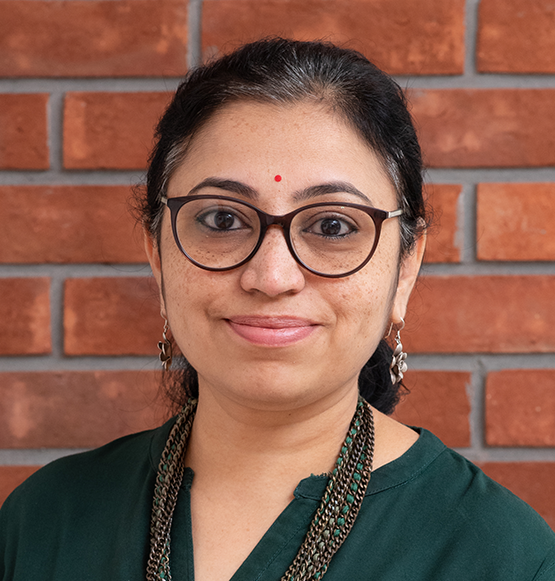
Smitha Tumuluru
Smitha Tumuluru is a documentary photographer and writer based in Bangalore, focusing on rural communities, gender, lifestyle, and culture. Since 2017, she has been documenting Tamil Nadu’s Irular tribe, with her work published in the People’s Archive of Rural India (PARI) and awarded Feature of the Year at The Rainbow Lit Fest 2024. With over a decade of experience in the development sector, she brings nuanced perspectives to her visual storytelling. Her projects include collaborations with Aid India-NSE Foundation, Naandi Foundation, and Nature Conservation Foundation. Her work has been exhibited internationally, including at Photoville (New York), SIPF (Singapore), and KLPF (Malaysia). She is currently documenting Karnataka’s Chittara folk art for an upcoming book.
Smitha Tumuluru’s documentary project captures the vibrant cultural traditions of rural Tamil Nadu, focusing on communities often overlooked in mainstream narratives. Her photographs explore themes of identity, faith, and resilience—ranging from mythological dramas performed by farmer-actors in Basthalapalli, to children navigating forested paths home from school in the Jawadhu Hills. She documents significant cultural events among the Irular tribe, including flashlight-lit beachside weddings and devotional gatherings marked by symbolic rituals, such as holding camphor fire in the mouth. With empathy and intimacy, Tumuluru reveals how art, ritual, and oral traditions remain central to these communities. Her work offers a compelling visual archive of everyday life shaped by belief, improvisation, and a deep connection to land and tradition.
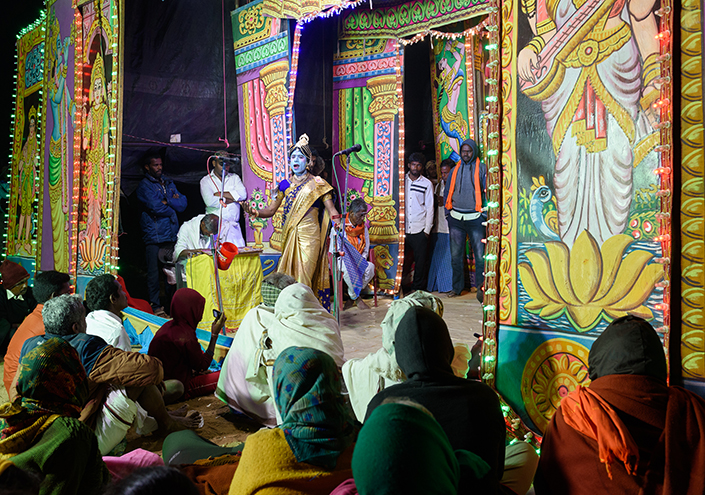
Chinnamma sings all night
A male actor in the lead role of heroine Chinnamma, sings passionately during a drama performance in Basthalapalli village in rural Tamil Nadu. Every February, during the annual temple festival in the village, hundreds of visitors camp overnight enduring the late winter chill to watch mythological dramas performed until dawn. Audiences often merge into the scene watching the performances from the wings and walking up to actors to pin money on their costumes to express their appreciation. These dramas are enacted by an all-male cast, comprising mostly farmers from the region, who take to acting during the farming off-season.
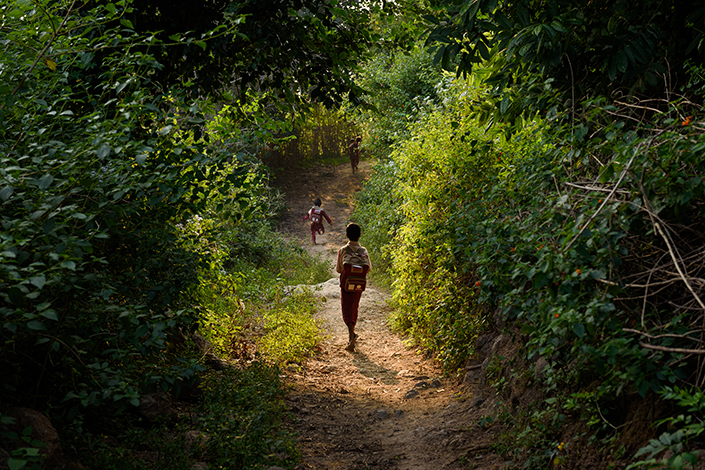
Long walk home
Saravana,9, and his bare-footed sister Thennarasi, 5, return from school to their house deep in a forested area of Jawadhu hills of Tamil Nadu, about a kilometer from the village’s main street at the school vehicle drop off point. Challenging commute is one of the common reasons why families in these hilly and forested areas of this region prefer to enroll their children in residential schools away from home.
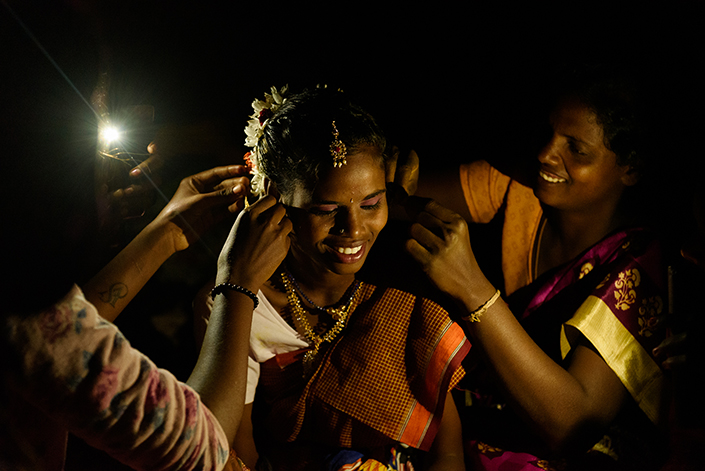
Wedding under a flashlight
Family members help bride Nandini, 18, get ready under the light from cell phone flashlights, for her pre-dawn wedding along the Mamallapuram coast. Gathered outside make-shift tents under the open skies on the beach, the family has to manage with no other illumination. Every year around February, thousands of families like Nandini’s, belonging to the vulnerable Irular tribe, gather along the Mamallapuram coast in Tamil Nadu to offer prayers to their deity Kanniamma and celebrate weddings, naming ceremonies and other important events.
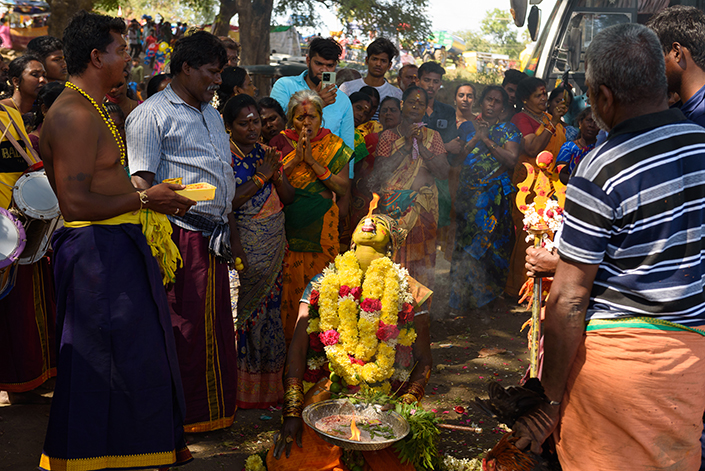
A matter of faith
A male devotee dressed like a goddess holds camphor fire in his mouth as a part of a religious vow, while onlookers watch and pray. Every year, around February, thousands of devotees gather at the Melmalayanur temple in Tamil Nadu state, to worship goddess Angala Parameshwari. Worshippers who undertake a vow, dress in vibrant costumes embodying various forms of their goddess. A few are believed to act as oracles sharing the divine word of their deity. This widely practiced subaltern tradition contrasts with the narratives typically highlighted in brahminical Hinduism.
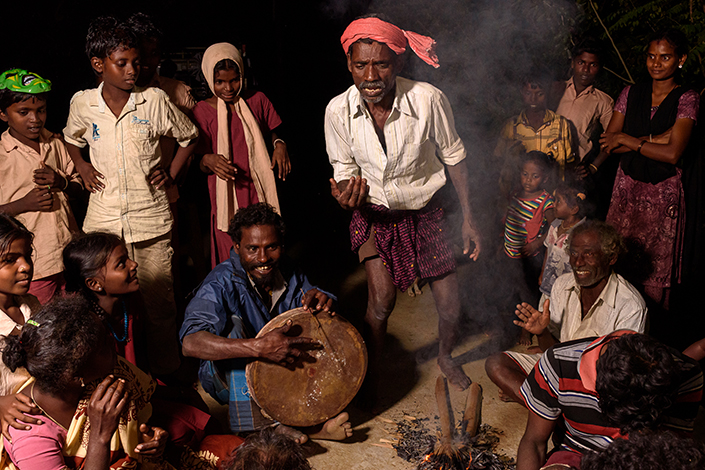
A musical soiree
A man from the Irular tribal hamlet of Dargas in Tamil Nadu, entertains his community with improvised songs, crafted on the spot. His catchy lyrics, directed at members of the gathering, humorously tease or poke fun at them creating a lively atmosphere. Until recent years, with the absence of electricity and devices like televisions or cellphones to entertain, singing and dancing to the accompaniment of traditional instruments, served both to entertain one another, and to keep their tradition alive.

